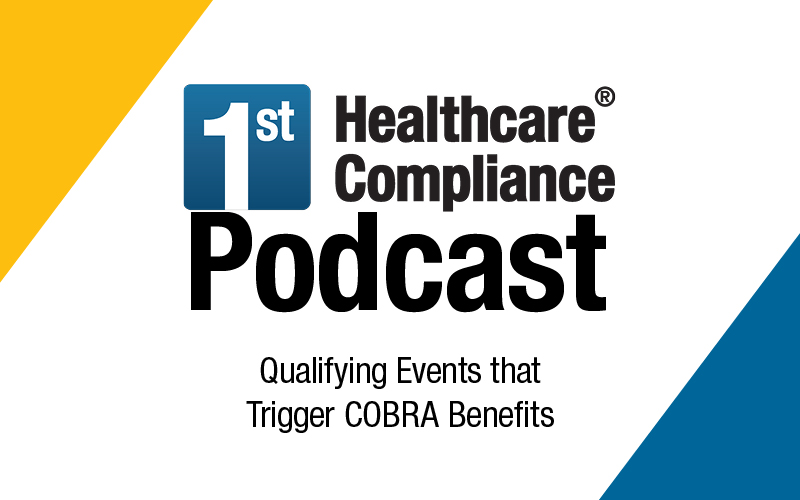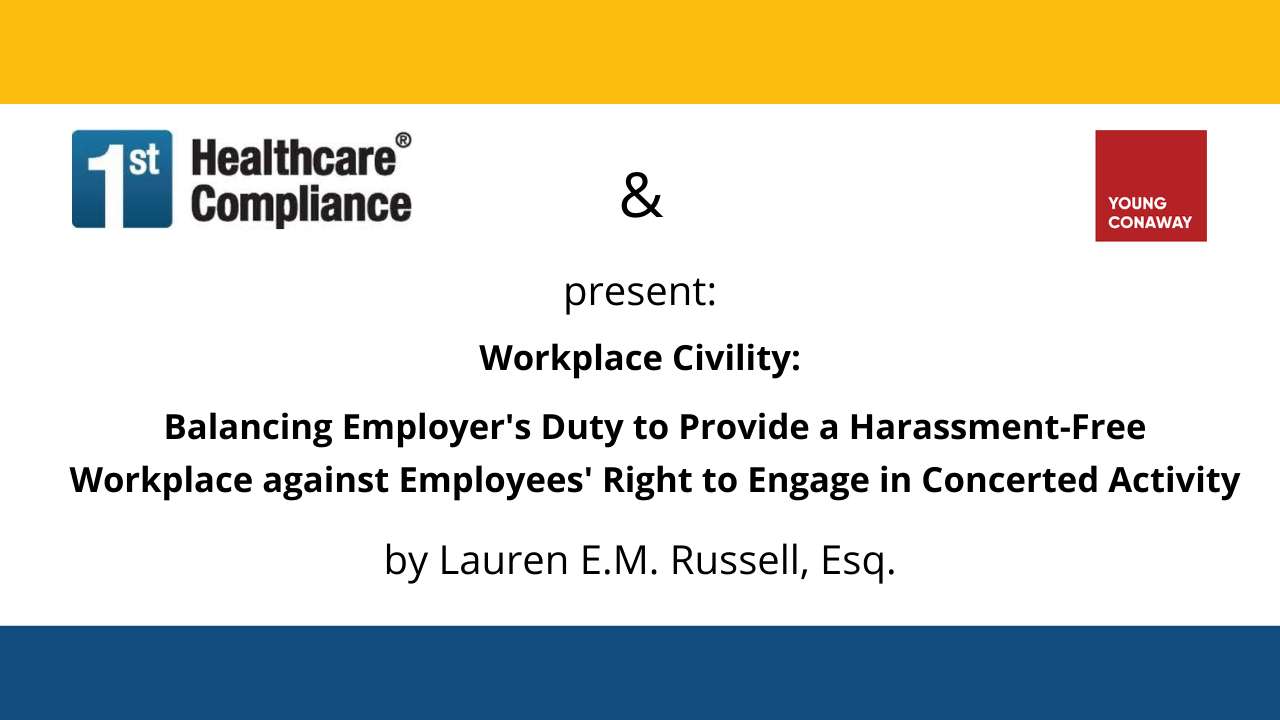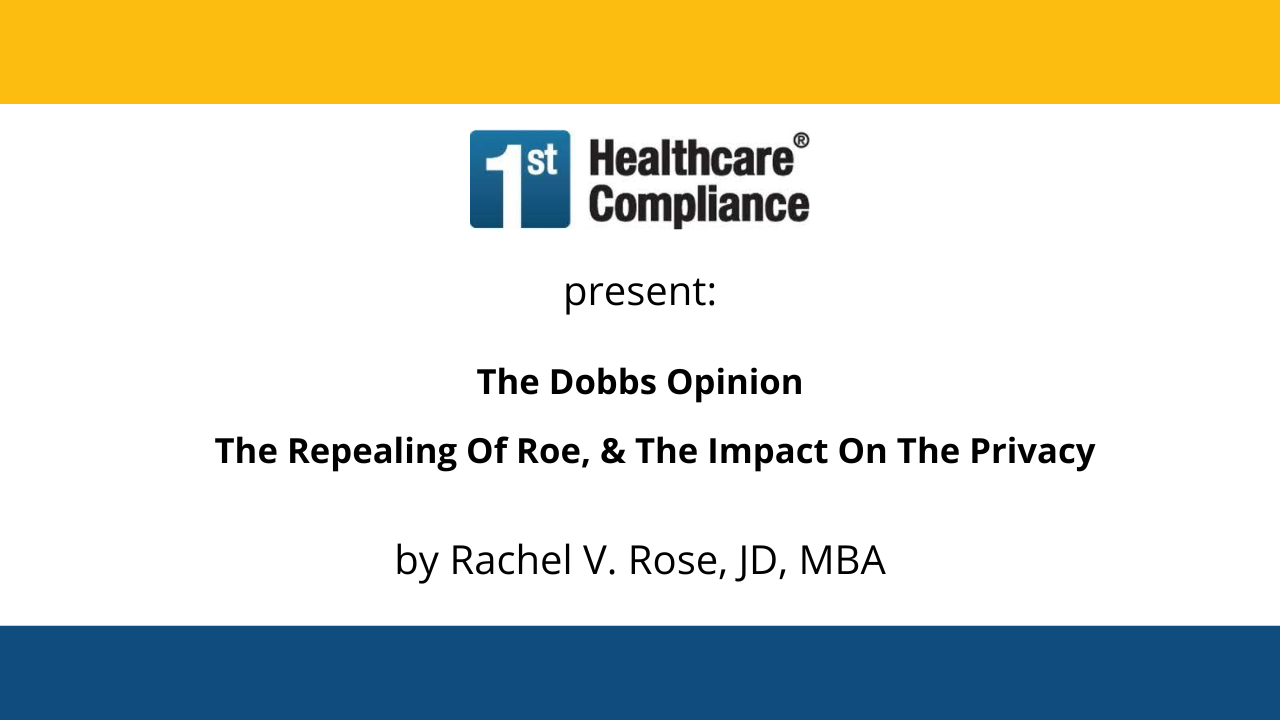First Healthcare Compliance Podcast: Qualifying Events that Trigger COBRA Benefits
Sheba Vine, JD, CPCO, talks about Qualifying Events that Trigger COBRA Benefits.
COBRA is a federal law and is short for the Consolidated Omnibus Budget Reconciliation Act of 1985. COBRA applies to employers with 20 or more employees that offer group health plans. COBRA provides the right to continue coverage in an employer group plan in certain instances.
If an individual elects COBRA coverage, then he or she is required to pay the full premium at the group plan rate. In addition to the premium, the employer can charge a 2% administration fee.
When determining if an employer has to comply with COBRA, it must have at least 20 employees. To determine this, both full-time and part-time employees are counted. A part-time employee only counts as a fraction, equal to the number of hours that the part-time employee worked divided by the hours an employee must work to be considered full time. If the employer doesn’t have 20 employees, then it is exempt from COBRA. But many states have a continuing coverage law that is similar to COBRA. These are referred to as the mini-COBRA laws.
Under COBRA only qualified beneficiaries have the benefits of COBRA. A qualified beneficiary is anyone that participates in the employer sponsored group health plan. This includes all employees that participate in the group plan, spouses and any dependent children. It is important to note that the individual must be covered by the plan on the day before an event that causes loss of coverage.
There are instances where COBRA benefits would not apply such as an employee who is not eligible to participate or an employee who has declined to participate in the health plan.
There are notices that the employer is required to provide under COBRA. A general notice of COBRA rights must be provided to covered employees and spouses, within the first 90 days of coverage under the plan. Employers usually include this notice in the Summary Plan Description. There is also the election notice, which describes the right to COBRA continuation coverage and how to make an election when there is a qualifying event that causes an employee and his or her family members to lose health coverage. A qualifying event triggers the right to COBRA coverage which includes: 1) an employee’s voluntary or involuntary termination of employment, unless it is due to the employee’s gross misconduct. Although COBRA does not define what counts as gross misconduct, many states refer to the definition provided under the respective state’s unemployment laws; 2) reduction in hours of employment if it effects their eligibility under the health plan; 3) divorce or legal separation of the spouse from the covered employee; 4) an employee’s entitlement to Medicare; 5) the death of a covered employee; and 6) the loss of dependent status, for example, when a dependent reaches an age that no longer qualifies them for coverage under the parent’s health plan. An individual that elects coverage under COBRA can stay on the employer’s group health plan for a maximum of 18 or 36 months, depending on the type of qualifying event.
Now that we know what events trigger COBRA, let’s talk about COBRA and FMLA. FMLA applies to employers with 50 or more employees and it provides up to 12 weeks unpaid job protected leave for an employee’s serious health condition, for the birth, adoption, or foster of a child, or for the employee to care for a family member’s serious health condition. It also applies for qualifying military leaves which provides for 26 weeks of unpaid job protected leave. For an employee to be eligible for these FMLA benefits, the employee must have worked for the employer for 12 months and have worked at least 1250 hours.
During any FMLA leave, an employer must maintain the employee’s coverage under any group health plan. Employer contributions must be the same as if the employee had continued to work his/her normal schedule. This means that if the health plan requires an employee to work 30 hours a week to maintain coverage, and if that employee goes out on FMLA leave for 12 weeks, then although the employee is not meeting his 30-hour requirement, the employer is legally required to continue the employee’s health coverage. If the employee fails to pay any premium amount to keep up the health insurance then the employer may terminate coverage provided that it gives advance written notice to the employee.
What if the employee in this example needs to extend his or her leave beyond the 12 weeks that FMLA provides, due to a disability accommodation under the Americans with disability act? What happens to their health coverage? In this case, the employer is no longer required to maintain health insurance as FMLA benefits have ended and if they have a 30 hour a week eligibility requirement then this is not being met so health insurance cannot continue. At this juncture, there is a qualifying event because there is a reduction in hours and the employer is required to provide a COBRA election notice informing the employee and other qualified beneficiaries of their right to continue coverage through COBRA.
What if the employee suffers a job-related illness or injury and is placed on a worker’s compensation leave of absence? If the employer has to comply with FMLA and the employee is eligible, the leave may come covered under FMLA and the employer would be required to continue health insurance coverage. But what if the employer does not have 50 or more employees to come under FMLA and there is no state law equivalent? First, the employer should review the health plan requirements to determine if coverage extends through a workers’ compensation leave. If the plan requires certain hours of work to be met each week, then the employee would be ineligible for coverage. Due to the reduction in hours, this would be a qualifying event that triggers COBRA and the employer would be required to provide the individual with an election notice.
Compliance with COBRAis as simple as providing the right notices and understanding when COBRA benefits are triggered. But if the employer fails to notify individuals of their rights to continue coverage, then this single error can expose the employer to lawsuits with huge penalties and attorney’s fees. It is critical to ensure employer obligations are followed. For more information visit the Department of Labor’s website where you can find sample general and election COBRA notices.
Subscribe: Amazon Music | Email | RSS | More







